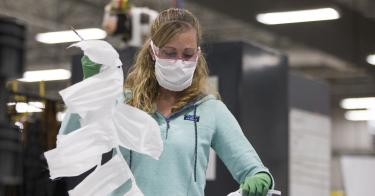The Centers for Disease Control and Prevention in April issued guidance for all Americans, urging them to wear cloth face masks in public to help slow the spread of COVID-19. At the same time, state and local governments began requiring residents to wear masks, especially in stores.
When the rapid spread of the disease and new regulations led to a shortage of face masks, both medical-grade and non-medical grade, the free market and civil society stepped up to meet the challenge.
The U.S. Department of Health and Human Services told the Senate’s health committee in March that the Strategic National Stockpile held only about 1% of the N95 and surgical masks needed to protect medical workers against the disease in a domestic pandemic scenario.
>>> What’s the best way for America to reopen and return to business? The National Coronavirus Recovery Commission, a project of The Heritage Foundation, assembled America’s top thinkers to figure that out. So far, it has made more than 260 recommendations. Learn more here.
It was clear that a response was needed to reverse the emerging shortage of masks for medical workers and American families.
While the Trump administration took action to address the shortage of N95 masks and other personal protective equipment, the story of how American businesses, big and small, and families reacted quickly to demand cloth face masks is one that should give us confidence in the power of the free market and civil society.
For example, a woman in Michigan started a Facebook group called “West Michigan sews hope,” which started out as a group making reusable cloth face masks for staff at Spectrum Health, a health system based in Grand Rapids.
The hospital told MLive in early April that it had received more than 300,000 “clinically equivalent” masks from their community.
The woman who started the group also worked with her church, Impact Church, to create mask-making kits for others to use when making masks for the hospital. Now, the group has broadened its reach to help provide masks for other institutions, such as local nursing homes and first responders.
Larger clothing and retail companies also responded to the increased demand for cloth masks.
Lilly Pulitzer produced masks in bright and cheerful patterns, selling them for about $13 each. At the same time, the company donated more than 67,000 masks to health care workers across the country.
The Gap also produced masks for individuals, costing about $6 each, and donated 50,000 masks to the Boys & Girls Clubs.
Masks from Vera Bradley, priced at about $8 each, sold out several times. The company donated more than $600,000 to the American Nurses Foundation’s Coronavirus Response Fund through mask sales.
Small businesses on Etsy.com also are working overtime to meet the demand for masks.
Before the pandemic, cloth masks were not very popular items for Etsy sellers, but the online marketplace reported that “110,000 Etsy sellers sold a total of 29 million face masks worth $346 million in its second quarter.”
Sellers were able to quickly respond to the increased demand thanks to platforms such as Etsy.
What do these stories teach us about individuals and companies in the U.S.?
First and foremost, the cloth mask shortage was met with both an economic and philanthropic response almost instantly.
Due to a lack of consistent demand in the U.S. prior to the pandemic, mask production had largely moved offshore.
Restarting that production and ensuring it was profitable could have been difficult for businesses because single-use masks (often imported from China) could be purchased for as little as $4 per box of 100. The opposite proved to be true.
The increased demand was met with an increase in price per mask. Plus, companies selling masks advertised their plans to make charitable contributions, justifying the higher prices.
Spontaneous charitable donations by individuals and religious organizations also were unexpected, but they demonstrate the strength of civil society in America and our willingness to chip in when others are in need.
Creators of cloth face masks were also incredibly innovative. Mask options for individuals went from plain blue, single-use masks to reusable masks that could be cleaned in the washing machine. Innovative masks included features such as adjustable ear loops, nose bridges, and slots for added filters.
In a very short period of time, mask producers went from meeting high demand to address public health to meeting the wide variety of preferences that consumers have.
Many Americans embraced the inconvenience of wearing masks by choosing fabrics to match their outfits or that represented their own personal style. Rather than brightening someone’s day with a smile, folks are spreading joy with masks sporting inspirational sayings or funny printed faces.
Even in the grim circumstances of a pandemic, the American spirit of entrepreneurship and philanthropy won the day.
This piece originally appeared in The Daily Signal



